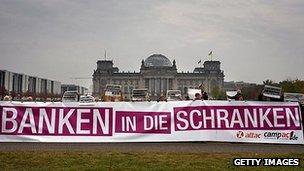The euro countdown - any solution?
- Published
- comments

Protesters in Berlin urge Germany to rein in the banks
The summit approaches. The eighth of the year. Like so many of its predecessors it is billed as "make or break".
The US Treasury Secretary Timothy Geithner is working Europe's capitals, piling on the pressure that this is the moment for Europe to fix its crisis. It is a summit, however, destined to disappoint.
The attention is on treaty change. That is a side-show, however. Changing treaties is about ensuring this crisis never repeats itself. It does little to address the fundamental problems that plague the eurozone right now.
At the heart of the crisis is debt - sovereign debt. All that has happened during the last 18 months of firefighting is that the debt mountains of the so-called Club Med (Greece, Portugal, etc) have grown.
The unemployment lines have grown longer. The preferred medicine - prescribed from Germany - has been austerity.
Although the deficits have started coming down growth has slowed. Year on year Italian output has shrunk by over 4%. And the imbalances (the differences) between the economies in the eurozone have widened.
Too big to rescue
The most important question remains unanswered. If Italy or Spain or both get into trouble and cannot finance their debt who will bail them out? Where is the back-stop?
They remain too big to be rescued. The main bail-out fund, the EFSF, will be up and running by the end of the year but, for the moment, it has not attracted outside investors to boost its funds above the 250bn euros (£214bn) it has left. That is why Europe's leaders are looking for extra resources from the IMF.
But treaty change remains at the top of the German wish list. Berlin wants to embed budgetary discipline in legislation and in the treaties, to ensure rules are not broken. Automatic sanctions will apply to those countries that break the rules. There will have to be oversight of national budgets before they are adopted by parliaments.
Some of these rules, of course, are already in place. They were just not enforced. Under the Stability and Growth Pact deficits were intended to be capped at 3% of GDP and debt at no more than 60% of GDP. Those rules were broken on more than 60 occasions and Germany and France led the way in 2005.
In order to establish a tough regime of enforcement the Germans believe a change to the treaties is necessary.
The Germans believe that financial markets will calm down if the existing monetary union evolves into a fiscal union where tax and spending are co-ordinated.
The French hope that by controlling spending it will free up the European Central Bank to intervene more robustly in support of countries like Italy and Spain, with the knowledge they will be unable to back off on their austerity plans.
A change to EU treaties would require the assent of all 27 countries. It would take time. The hope is that a new text would be agreed by March and that national governments would give their apporval by the end of 2012.
However, it is possible that some countries would insist on putting the changes to their people - possibly Ireland and the Netherlands.
Diplomatic manoeuvres
If getting the approval of all 27 proves difficult then there is the option of a new treaty involving just the 17 countries in the eurozone. President Sarkozy is said to favour this option. It would side-step having to negotiate with potentially difficult countries like Britain.
But some eurozone members would be nervous too. An inter-governmental treaty - outside the EU - could lessen the influence of smaller countries. (It is also possible for the 17 to agree a treaty but to use the EU institutions like the Commission and the courts to implement the new rules. For that to happen all 27 would have to give their approval.)
A third option has been put forward by the President of the Council, Herman Van Rompuy. He believes much can be achieved without treaty change. Extra budgetary discipline could be achieved by changing the protocols. For most countries this would not require ratification at national level. What this method could not support would be automatic sanctions against offenders.
The British are inclined to back treaty change if it helps calm a crisis that is having a "chilling effect" on the UK economy, where manufacturing output is falling. Prime Minister David Cameron has made it clear that in exchange for British support he would want safeguards over the operation of the single currency and protection for the City of London.
It will be a hand that will have to be played carefully. The big fear for the UK government is that if a new treaty is signed just by the 17 countries that use the euro it could lead to Britain being marginalised.
One of the most significant features of the week was the giant U-turn made by the Germans over whether private investors should take losses.
At Deauville, in October last year, Angela Merkel had insisted that investors in Greece should take a hit. So today negotiations continue on investors accepting losses of up to 50% of their investments. But now we are told that Greece was a one-off. It will never happen again. It will not be a feature of the permanent bail-out mechanism, the ESM, as was originally intended.
The truth is that what the German chancellor had pushed for badly damaged confidence in buying European debt. It was, with hindsight, one of the big miscalculations of the crisis.
In the end the test of whether this summit is a success will be whether investors lend to countries like Spain and Italy.